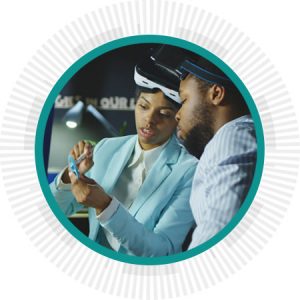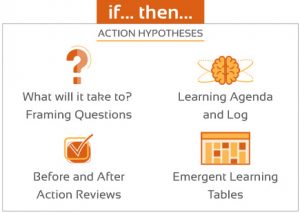Introduction
Welcome! We’re glad you’re here.
For the past 25 years, VentureWell has been working to support creative, early-stage innovators on their journeys to take bold ideas from concept to scalable impact.
This publication is a step toward digging deeper into both the innovator’s journey and our own. It focuses on lessons learned, struggles, and ongoing opportunities to advance diversity, equity, and inclusion in three areas of VentureWell’s work:
- programmatic activities within our flagship Entrepreneur Team (E-Team) program, which provides support for teams of early-stage, US-based student innovators through grants, training, coaching, and networking;
- organizational culture and practices, including our “messy chapter one” efforts to take on this work, as well as our staff-driven engagement and learning activities, short- and longer-term organizational commitments, and enhancements to internal policies and practices; and
- field-building, including defining our role as a “convener-participant” in this work and seeking frequent feedback from and collaboration with experts in the field who bring equity work to life in many different contexts and communities.
We see this as the beginning of a conversation, and welcome your perspectives on what we’ve shared.

 In early 2019, VentureWell embarked on a journey to build more equitable and inclusive pathways to innovation and entrepreneurship (I&E) for students in science and technology (S&T). Since 1995, we have been working on the leading edge of I&E to cultivate and support inventors, innovators, and entrepreneurs who are driven to solve the world’s biggest challenges and to create lasting impact in fields such as biotechnology, healthcare, energy, and materials. In providing grants and training to thousands of student innovators and higher education faculty members, VentureWell has supported thousands of individuals across the US and has helped to bring groundbreaking technological advancements to millions of people in more than 90 countries.
In early 2019, VentureWell embarked on a journey to build more equitable and inclusive pathways to innovation and entrepreneurship (I&E) for students in science and technology (S&T). Since 1995, we have been working on the leading edge of I&E to cultivate and support inventors, innovators, and entrepreneurs who are driven to solve the world’s biggest challenges and to create lasting impact in fields such as biotechnology, healthcare, energy, and materials. In providing grants and training to thousands of student innovators and higher education faculty members, VentureWell has supported thousands of individuals across the US and has helped to bring groundbreaking technological advancements to millions of people in more than 90 countries. 



 One of the primary opportunities for VentureWell to test and iterate strategies and solutions for advancing equity was within its
One of the primary opportunities for VentureWell to test and iterate strategies and solutions for advancing equity was within its 
 A second area of opportunity for VentureWell to advance equity and inclusion was a deeper and more intentional focus on organizational practices and culture change. Staff noted that while some of these efforts had begun prior to the start of The Lemelson Foundation’s award, they were also inextricably linked to the other aspects of VentureWell’s equity work. We appreciate the Foundation’s interest in and support of organizational efforts alongside our programmatic and field-building work; this has provided the opportunity for VentureWell to truly ‘develop a holistic organizational approach,’ as framed in action area six in our
A second area of opportunity for VentureWell to advance equity and inclusion was a deeper and more intentional focus on organizational practices and culture change. Staff noted that while some of these efforts had begun prior to the start of The Lemelson Foundation’s award, they were also inextricably linked to the other aspects of VentureWell’s equity work. We appreciate the Foundation’s interest in and support of organizational efforts alongside our programmatic and field-building work; this has provided the opportunity for VentureWell to truly ‘develop a holistic organizational approach,’ as framed in action area six in our 
